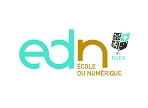FORMATIONS |
Fiche détaillée d'un cours
 | Basics in Cellular and Molecular Biology | ||
2023-2024 | FrECOLE DU NUMERIQUE
(
EDN
)
| ||
Code Cours : | 2324-EDN-COMP-EN-4007 | ||
| Niveau | Année de formation | Période | Langue d'enseignement |
|---|---|---|---|
| S1 | FrAnglais |
- Ce cours apparaît dans les formations suivantes :
- Ecole Du Numérique (EDN) - Master 1 DATA Management In Biosciences - S1 - 5 ECTS
Pré requis
Biology I, Biochemsitry I (B102), Biology II & Biochemsitry II (B201), Biochemsitry III (B404), Immunology (B503), Molecular Genetics (B602).
Objectifs du cours
- Understanding the principle molecular and cellular mechanisms that govern biological systems both in physiological and pathological context.
Understanding the experimental tools and assays that are used to study those mechanisms.
Contenu du cours
- The Cell as Unit of health and disease :
Review the organization of the genome, the major cellular mechanisms and dynamics, cellular metabolism, cellular activation, signaling, the major signaling transduction pathways, interactions with cell environment, cell division and cell cycle
2. Cellular responses to stress and toxic insults : adaptation, Injury and Death
Understand the cellular response to stress and noxious stimuli, adaptation of cellular growth and differentiation including hypertrophy, hyperplasia, atrophy and metaplasia, cell injury causes, consequences, mechanisms, and cell death with selected examples of cellular response to stress. Introduce cell aging
3.Inflammation and Repair
Understand the causes of inflammation and the recognition of microbes and damaged cells.
View the mechanisms of responses in acute inflammation : blood vessels reaction, leukocytic implication, clearance of pathogens, molecular mediators and the morphologic patterns of acute inflammation
4.Genetic Disorders :
Review the molecular and cellular genetic of diseases. Mendelian disorders, complex multigenic disorders, chromosomal disorders, single-gene disorders with non-classic inheritance.
Understand the major molecular diagnosis methods.
5.Diseases of the immune system
Review the major mechanisms of immune response and introduce disorders of immune system : hypersensitivity, autoimmune diseases and immunodeficiency syndromes. Understand the rejection of tissue transplant.
6.Neoplasia and Biology of Cancer
Understand the nomenclature of neoplasia, the characteristics of begnin and malignant neoplasms, the epidemiology and the molecular basis of cancer, identify the carcinogenic agents and their cellular interactions and address the clinical aspects of neoplasia.
7.Infectious diseases
Review the general principles of microbial pathogenesis including the microbial cause of diseases, host-pathogen interactions, host damage, and the inflammatory responses to infection.
Distinguish principle types of viral, bacterial, fungal and parasitic infections and introduce emerging infectious diseases.
Modalités d'enseignement
Organisation du cours
Lectures and readings. Students are meant to prepare classes based on specied documentation.
PEDAGOGICAL APPROACH
Interaction during the class is ensured by lecturer through its knwoledge, the animation of the class through open questions to lead students to understand the mechanisms of diseases, the major idea of an article and the link between the different disciplines addressed during the class. Students are encouraged to read the papers and chapters related to the class in advance in order to enahance a better interaction at class.
Students have also the possibility to attend individual interview with the lecturer in order to measure their knowledge and challenge theur Scientific curiosity.
Méthodes pédagogiques
Évaluation
Examen : coeff. 1
Bibliographie
Books:||||
Vinay Kumar, Abul K. Abbas, and Jon C. Aster, eds. Robbins and Cotran Pathologic Basis of Disease. 10th ed. Philadelphia, PA: Elsevier Saunders, 2020. ISBN: 9780323531139. Chapters 1, 2, 3, 5, 6, 7 & 8.||||
Articles :||||
Coussens, L. M., and Z. Werb. Inflammation and cancer. Nature 420, no. 6917 (December 19-26, 2002): 860-7.||||
E, N.K., A, K., A, S., D, S., S, K., A, P., D, A., P, K., T, N., Z, F., 2021. Basic principles of molecular biology of cancer cell-Molecular cancer indicators. J. BUON Off. J. Balk. Union Oncol. 26.||||
Furman, D., Campisi, J., Verdin, E., Carrera-Bastos, P., Targ, S., Franceschi, C., Ferrucci, L., Gilroy, D.W., Fasano, A., Miller, G.W., Miller, A.H., Mantovani, A., Weyand, C.M., Barzilai, N., Goronzy, J.J., Rando, T.A., Effros, R.B., Lucia, A., Kleinstreuer, N., Slavich, G.M., 2019. Chronic inflammation in the etiology of disease across the life span. Nat. Med. 25, 1822–1832. https://doi.org/10.1038/s41591-019-0675-0||||
Li, S., Wang, H., Shao, Q., 2023. The central role of neutrophil extracellular traps (NETs) and by-products in COVID-19 related pulmonary thrombosis. Immun. Inflamm. Dis. 11, e949.||||
Robles-Remacho, A., Sanchez-Martin, R.M., Diaz-Mochon, J.J., 2023. Spatial Transcriptomics: Emerging Technologies in Tissue Gene Expression Profiling. Anal. Chem.||||
Rubinow, K.B., Rubinow, D.R., 2017. In immune defense: redefining the role of the immune system in chronic disease. Dialogues Clin. Neurosci. 19, 19–26.||||
Waldum, H., Fossmark, R., 2023. Inflammation and Digestive Cancer. Int. J. Mol. Sci. 24, 13503.||||
Li, S., Wang, H., Shao, Q., 2023. The central role of neutrophil extracellular traps (NETs) and by-products in COVID-19 related pulmonary thrombosis. Immun. Inflamm. Dis. 11, e949.||||
Robles-Remacho, A., Sanchez-Martin, R.M., Diaz-Mochon, J.J., 2023. Spatial Transcriptomics: Emerging Technologies in Tissue Gene Expression Profiling. Anal. Chem.||||
Rubinow, K.B., Rubinow, D.R., 2017. In immune defense: redefining the role of the immune system in chronic disease. Dialogues Clin. Neurosci. 19, 19–26.||||
Waldum, H., Fossmark, R., 2023. Inflammation and Digestive Cancer. Int. J. Mol. Sci. 24, 13503.
* Informations non contractuelles et pouvant être soumises à modification


















































































